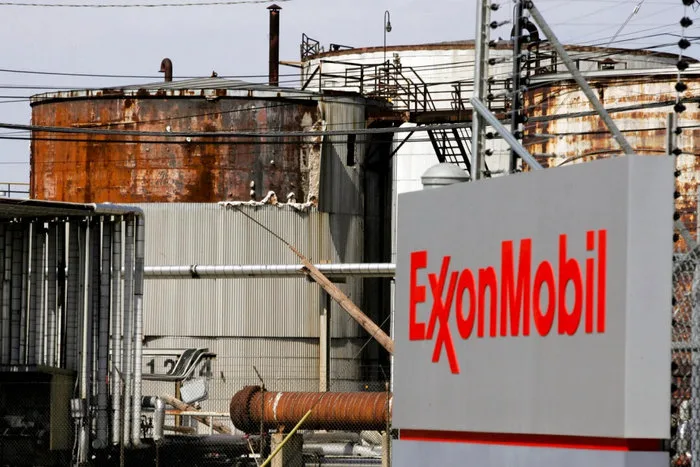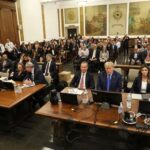By Naveen Athrappully
Energy giant ExxonMobil filed a lawsuit on Oct. 24 against California officials—including Lauren Sanchez, chair of the California Air Resources Board, and Attorney General Robert A. Bonta—accusing the state’s climate disclosure regulations of harming the company.
The complaint, filed in the District Court for the Eastern District of California, is about two climate laws approved by Gov. Gavin Newsom in October 2023: SB 253 and SB 261.
SB 253 requires businesses with total annual revenues of more than $1 billion that operate in California to disclose their greenhouse gas emissions, while SB 261 requires businesses with more than $500 million in annual revenues operating in the state to develop a report on their climate-related financial risks.
The bills are scheduled to come into effect in 2026.
“Both bills require ExxonMobil to espouse California’s preferred framing for issues of immense public concern,” the company said in its lawsuit.
The bills require the company to “serve as a mouthpiece for ideas with which it disagrees,” it said, while using frameworks that place “disproportionate blame” of emissions and climate risks on companies like ExxonMobil just for “being large.”
At the time of signing SB 253, Newsom said in a message that the bill was an important policy demonstrating California’s “bold responses to the climate crisis.”
Newsom said SB 261 would illustrate the real risks posed by climate change for businesses operating in the state. The governor expressed hope that the measure would encourage businesses to adopt practices that aim to minimize and avoid climate risks.
Meanwhile, the lawsuit said SB 253 compels ExxonMobil to supplement its speech with what the company believes is “unnecessary and counterproductive.”
SB 261 is “broader in scope than ExxonMobil’s current disclosures and will require the company to engage in granular conjecture about unknowable future developments and to publicly disseminate that speculation on its website,” it said
“California may believe that companies that meet the statutes’ revenue thresholds are uniquely responsible for climate change, but the First Amendment categorically bars it from forcing ExxonMobil to speak in service of that misguided viewpoint.”
ExxonMobil said it has, for years, disclosed its global greenhouse gas emissions using its own guidelines to estimate those numbers while making sustainability reports available to the public.
SB 253 forces ExxonMobil to estimate and recalculate historical emissions for all its business activity worldwide, such as lithium production in Arkansas or oil production in Guyana, irrespective of whether these products enter the California market, the lawsuit said.
Since both bills create “content-based speech regulation divorced from any legitimate state regulatory interest,” the court should rule them as a violation of the First Amendment and ban their enforcement against ExxonMobil, the complaint said.
The Epoch Times reached out to the offices of Lauren Sanchez and Robert A. Bonta for comment, but did not receive any response by publication time.
In January 2024, a group of plaintiffs, including the U.S. Chamber of Commerce, the American Farm Bureau Federation, and the California Chamber of Commerce, filed a lawsuit challenging SB 253 and SB 261, alleging a First Amendment violation.
At the time, Sen. Scott Wiener (D-Calif.) accused the plaintiffs of trying to “block basic transparency for the public.”
“The U.S. Chamber of. Commerce’s lawsuit against these groundbreaking climate laws is straight up climate denial,” Wiener said in a January 2024 statement.
“The Chamber is taking this extremist legal action because many large corporations—particularly fossil fuel corporations and large banks—are absolutely terrified that if they have to tell the public how dramatically they’re fueling climate change, they’ll no longer be able to mislead the public and investors.”
Wiener dismissed the lawsuit’s claims that companies would have to bear compliance costs of $1 million or more for the new laws, arguing the actual costs would be “minuscule.”
ExxonMobil’s lawsuit against California comes at a time when the state is contending against the federal government over greenhouse gas emissions.
President Donald Trump has taken action to invalidate the state’s climate laws. In June, he signed a package of resolutions that blocked California’s vehicle emission mandates, including plans to phase out the sale of new gasoline-only vehicles by 2035.
In August, the Department of Justice filed two federal complaints against the California Air Resources Board for enforcing the Clean Air Act emissions standards despite Trump’s having voided it.





